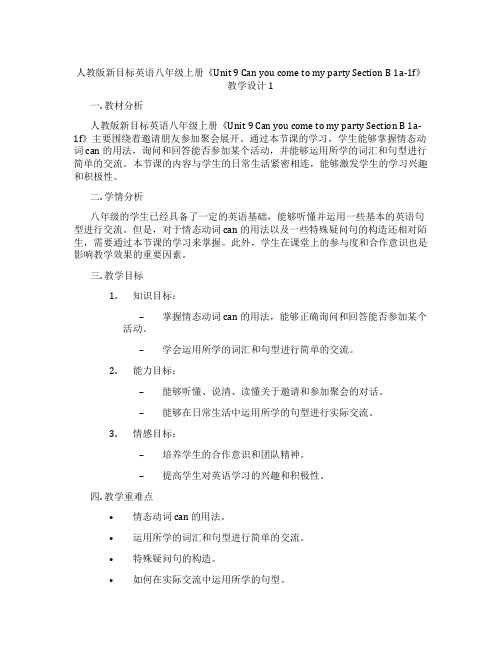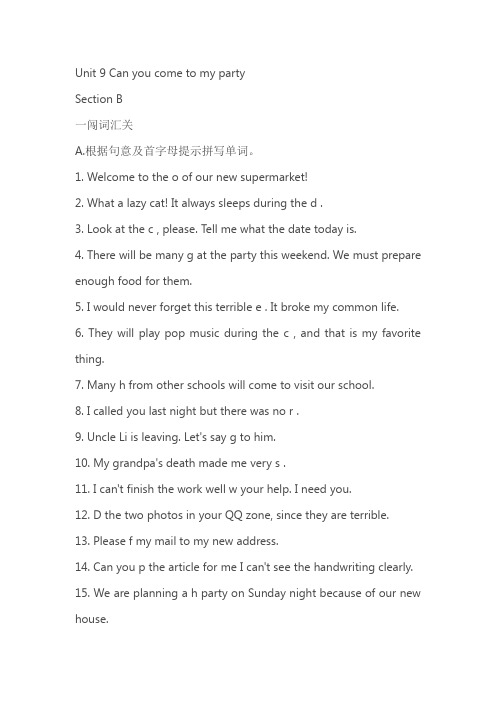人教版英语八年级上册unit9 can you come to my party 3
- 格式:doc
- 大小:66.00 KB
- 文档页数:3


人教版新目标英语八年级上册《Unit 9 Can you come to my party Section B 1a-1f》教学设计1一. 教材分析人教版新目标英语八年级上册《Unit 9 Can you come to my party Section B 1a-1f》主要围绕着邀请朋友参加聚会展开。
通过本节课的学习,学生能够掌握情态动词 can 的用法,询问和回答能否参加某个活动,并能够运用所学的词汇和句型进行简单的交流。
本节课的内容与学生的日常生活紧密相连,能够激发学生的学习兴趣和积极性。
二. 学情分析八年级的学生已经具备了一定的英语基础,能够听懂并运用一些基本的英语句型进行交流。
但是,对于情态动词 can 的用法以及一些特殊疑问句的构造还相对陌生,需要通过本节课的学习来掌握。
此外,学生在课堂上的参与度和合作意识也是影响教学效果的重要因素。
三. 教学目标1.知识目标:–掌握情态动词 can 的用法,能够正确询问和回答能否参加某个活动。
–学会运用所学的词汇和句型进行简单的交流。
2.能力目标:–能够听懂、说清、读懂关于邀请和参加聚会的对话。
–能够在日常生活中运用所学的句型进行实际交流。
3.情感目标:–培养学生的合作意识和团队精神。
–提高学生对英语学习的兴趣和积极性。
四. 教学重难点•情态动词 can 的用法。
•运用所学的词汇和句型进行简单的交流。
•特殊疑问句的构造。
•如何在实际交流中运用所学的句型。
五. 教学方法1.任务型教学法:通过设置各种任务,引导学生积极参与课堂活动,提高学生的实际运用能力。
2.情境教学法:通过创设各种真实的社交场景,让学生在特定的情境中学习英语,提高学生的交际能力。
3.合作学习法:鼓励学生进行小组合作,培养学生的团队精神和合作能力。
六. 教学准备1.教材:人教版新目标英语八年级上册。
2.多媒体设备:电脑、投影仪、音响等。
3.教学课件:根据教学内容制作相应的课件。
4.教学素材:与本节课主题相关的图片、视频等。

Unit 9 Can you come to my partySection B一闯词汇关A.根据句意及首字母提示拼写单词。
1. Welcome to the o of our new supermarket!2. What a lazy cat! It always sleeps during the d .3. Look at the c , please. Tell me what the date today is.4. There will be many g at the party this weekend. We must prepare enough food for them.5. I would never forget this terrible e . It broke my common life.6. They will play pop music during the c , and that is my favorite thing.7. Many h from other schools will come to visit our school.8. I called you last night but there was no r .9. Uncle Li is leaving. Let's say g to him.10. My grandpa's death made me very s .11. I can't finish the work well w your help. I need you.12. D the two photos in your QQ zone, since they are terrible.13. Please f my mail to my new address.14. Can you p the article for me I can't see the handwriting clearly.15. We are planning a h party on Sunday night because of our new house.B.用所给词的适当形式完成句子。

人教版英语八年级上册Unit 9《Can you come to my party》教学设计一. 教材分析人教版英语八年级上册Unit 9主要讲述了关于邀请别人参加聚会的情境。
通过本单元的学习,学生能够掌握与聚会相关的词汇和表达方式,学会如何礼貌地邀请别人,并能够用英语进行简单的交流。
本单元的核心句型是“Can you come to my party?”,以及回答“Yes, I can.”和“No, I can’t.”。
二. 学情分析八年级的学生已经具备了一定的英语基础,能够听懂并运用简单的英语进行交流。
他们对学习英语有浓厚的兴趣,并且愿意积极参与课堂活动。
然而,部分学生可能在口语表达和听力方面还存在一定的困难,需要教师的引导和帮助。
三. 教学目标1.知识目标:学生能够掌握与聚会相关的词汇和表达方式,学会如何礼貌地邀请别人,并能够用英语进行简单的交流。
2.能力目标:学生能够听懂并运用核心句型“Can you come to my party?”进行交流,提高口语表达能力。
3.情感目标:学生能够在课堂上积极参与,培养合作意识和团队精神。
四. 教学重难点1.重点:学生能够听懂并运用核心句型“Can you come to my party?”进行交流。
2.难点:学生能够正确使用情态动词“can”来表达自己的能力。
五. 教学方法1.情境教学法:通过创设真实的聚会情境,激发学生的学习兴趣,提高他们的口语表达能力。
2.交际法:通过小组讨论和角色扮演等方式,培养学生的合作意识和团队精神。
3.任务型教学法:通过完成各种任务,引导学生主动参与学习过程,提高他们的自主学习能力。
六. 教学准备1.教学材料:教材、多媒体课件、录音机、磁带或音频文件。
2.教学环境:教室布置成聚会场景,悬挂气球、彩带等装饰物。
七. 教学过程1.导入(5分钟)教师以提问的方式引导学生回顾已学过的与聚会相关的词汇,如“birthday party”、“house party”等。

八年级上unit9 Can you come to my party?(含答案)一.单项选择1.—It’s too late. I have to go now. —Oh, it’s raining outside. Don’t leave________it stops.A. sinceB. untilC. while2. —Dad, must we wait until the light becomes green?—Yes, I’m afraid we________. That’s the traffic rule.A. canB. mayC. have toD. Need3. —Can you give us more examples? —OK, I’ll give you_______example now.A. otherB. the otherC. anotherD. others4 My family has two dogs. One is white, _____is black.A.otherB. anotherC. the otherD. others5.—Jenny, can you come to my birthday party on Sunday? —Sure, _______.A.I’d loveB. I can’tC. I’d love toD. I have to6.—Why are you so tired these days? —Well, I have_____work to do.A.too muchB. too manyC. much tooD. so many7.John didn’t go to bed______the football match on TV was over last night, so he was sleepy now.A.becauseB.untilC. ifD. but8.—Can you go shopping with me this afternoon, Linda?—_____. I must study for my English test.A.I hope soB. I’m afraid notC. SureD. I’d love to9.—Would you please see the film Iron Man3 with me tonight, Kate?—I’d love to, but I’ve_______Linda’s invitation to dinner.A.sufferedB. earnedC. receivedD. accepted10.H e may refuse______such a silly question.A.answerB. answeredC. answeringD. to answer11.T he speech contest will start_____2: 00pm______Friday afternoon.A. at; inB. at; onC. in; onD. at; at12. —What are you going to do this evening?—I’m not sure. I_____watch TV at home.A. mustB. have toC. mightD. should13. —______are you going to the mountains with on Sunday, Tom? —My friends.A. WhenB. WhatC. WhereD. Who14. —Jim,_______you go and play basketball with us now?—Sorry, I can’t. I have to clean my room at home.A. AreB. CanC. MustD. Do15. We have to_______ourselves when we are away from home.A. look atB. look forC. look upD. look after16. —I’m looking forward to_______my parents soon. What about you?—Me too.A. seeingB. seeC. sawD. to see17. I couldn’t do it________your great help. Thanks a lot!A. withB. withoutC. forD. to18 .One important aim of our school is to prepare us for the future_____ we can face all theA.so farB. so thatC. even ifD. if only19. Alice kept_______all day because she lost her favourite toy.A.gladB. sadC. surprisedD. tired20.We all know that fish can’t live_______water.A.withB. afterC. byD. without21.Jonson is looking forward to________the Great Wall next year.A.visitedB. visitC. visitsD. visiting22.The girl saved every coin_______she could buy her father a present on Father’s Day.A. ifB. in order toC. so thatD. because23. _______wonderful concert they are putting on in the movie theater!A. HowB. WhatC. What aD. What an24. I’ll invite all my friends_______my birthday party.A. withB. atC. inD. to25. The football match______on the evening of next Saturday in the city gym.A. wasB. willC. will beD. be26. —_______go for a picnic this weekend. —Good idea.A. Can youB. What aboutC. When do youD. Let’s27. The final exam is coming. I________try my best to study for it.A. mustB. mightC. needD. would28. The students are very ______ at the ______ news.A. surprised;surprisingB. surprising;surprisedC. surprised;surprisedD. surprising;surprising29. She spends ______ time (in) watching TV. It is bad for her eyes.A. much tooB. too manyC. too muchD. many too30. —Must I be home before nine o'clock, Mom?— No, you ________. But you have to come back before ten o'clock.A.needn't B.can't C.mustn't D. shouldn’t二.用所给词的适当形式填空1.Julia_______(have) to help her mother do the housework on weekends.2.Thanks a lot for_______(show) me around your school.3. —Are you free_______(hang) out with me this afternoon?—No, I’m not free. I might visit my grandparents.4.—Hi, Tim. When______you_______(finish) your homework? —About in half an hour.5. We’re______(plan) to play basketball after school.6. I’m glad that Vincent accepted the______(invite).7. All of us are making________(prepare) for the end-of-year party.8. I'm very sorry ______(hear)that you are ill.9. My cousin is looking forward to________(find) a good job soon.10. Ms. Yang went out of the room without__________(say) anything.11. Thanks for your ______ (prepare) for the party.12. I would love ______(make)friends with new students.13. —Can he go to the baseball game?—No,he can't.He has to ______(study)for a test.14. We ______(catch) some fish last Friday.三.先选词并用其适当形式填空A.catch, exam, flu, prepare, available1.The final_______is coming. All the students are working hard for it.2.Linda has to go to the doctor this afternoon because she has the________.3. Walk ahead, please. I’ll________you up soon.4. —Can you come over to my house this weekend? —Sorry, I’m not_______. I have to help my parents.5. —What are you busy doing now? —Well, I’m busy_______for the English party.B.weekday, what, look after, have, study1.We usually go to work on________and have a rest on weekends.2.He can’t play soccer with us this afternoon. He________a piano lesson.3.I can’t go shopping with you, Julie. I have to______for my Englis h exam.4.Julie’s mother is ill. She must________her in the hospital.5. —_______is today? —It’s Tuesday the12th.C. concert, guest, daytime, open, event1.I would like to invite you to the______of our new school.2.Nancy enjoys music. I bought her a ticket to the_______on her birthday.3.The hotel now opens to the____.4.People work in the______and sleep at night.5. The band usually plays for school______, such as School Day, School Music Festival and so on.四.按要求改写句子1. It’s twelve o’clock?(对画线部分提问)_____ ______ is it?2.I got a letter from my pen pal in Australia last night.(改为同义句)I ______ ________ my pen pal in Australia last night3.The meeting starts 10:00.(对画线部分提问)______ ______the party______?4.She has to go to see the doctor.(改为否定句)She ______ __________ to go to see the doctor.5.People in that town have to move to a new place.(改为一般疑问句)______ people in that town ______ ______ move to a new place?八年级上unit9 Can you come to my party?一.单项选择1-5.BCCCC 6-10.ABBDD 11-15.BCDBD 16-20.ABBBD21-25.DCCDC 26-30.DAACA二.用所给词的适当形式填空1.has2.showing3.to buy4.will finish5.planning6.invitation7.preparations8.to hear9.finding 10.saying 11.preparation12.to make 13.study 14.caught三.先选词并用其适当形式填空A. 1.exam 2.flu 3.catch 4.available 5.preparingB. 1.weekdays 2.has 3.study 4.look after 5.WhatC. 1.opening 2.concert 3.guests 4.daytime 5.events四.按要求改写句子1.What time2.heard,from3.When,does,start4.doesn’t,have5.Do,have,to。

人教版新目标英语八年级上册《Unit 9 Can you come to my party Section B 1a-1e》教学设计1一. 教材分析人教版新目标英语八年级上册《Unit 9 Can you come to my party Section B 1a-1e》主要讲述了邀请朋友参加聚会的情景。
本节课主要让学生掌握情态动词can的用法,能够用can提问和回答邀请,以及表达自己和他人的喜好。
通过本节课的学习,学生能够提高听力、口语、阅读和写作能力。
二. 学情分析八年级的学生已经具备一定的基础知识,对于情态动词have和do的用法有一定的了解。
但学生在实际应用中,尤其是在听力方面还需加强。
此外,学生对于西方的聚会文化可能了解不多,需要在教学中进行适当的引导和拓展。
三. 教学目标1.知识目标:学生能够掌握情态动词can的用法,能够用can提问和回答邀请,以及表达自己和他人的喜好。
2.能力目标:学生能够提高听力、口语、阅读和写作能力。
3.情感目标:通过本节课的学习,学生能够学会礼貌地邀请他人参加聚会,提高人际交往能力。
四. 教学重难点1.重点:学生能够掌握情态动词can的用法,能够用can提问和回答邀请,以及表达自己和他人的喜好。
2.难点:学生能够在实际情景中正确运用情态动词can,尤其是在听力方面。
五. 教学方法1.任务型教学法:通过设置各种真实的任务,让学生在完成任务的过程中运用所学知识。
2.交际法:通过模拟真实的交际情景,让学生在实际交流中提高口语能力。
3.视听法:利用多媒体教学资源,提高学生的听力能力。
六. 教学准备1.教师准备:备好相关教学材料,如PPT、听力材料、练习题等。
2.学生准备:预习本节课的内容,了解基本的聚会文化。
七. 教学过程1.导入(5分钟)教师通过提问方式引导学生回顾情态动词have和do的用法,为新课的学习做好铺垫。
2.呈现(5分钟)教师播放听力材料,让学生听懂并理解邀请他人参加聚会的情景。
人教新目标八年级上册英语《Unit 9 Can you come to my party?》Section B_教案3一. 教材分析人教新目标八年级上册英语《Unit 9 Can you come to my party?》Section B 主要围绕邀请朋友参加聚会展开。
本节课通过学习一般现在时的特殊疑问句及其回答,使学生能够运用所学知识进行实际交流。
本节课的内容与学生的生活紧密相连,有利于激发他们的学习兴趣和参与欲望。
二. 学情分析八年级的学生已经掌握了英语学习的基本语法和词汇,具备一定的听、说、读、写能力。
对于一般现在时的疑问句及其回答,大部分学生已经有所了解,但仍有部分学生掌握不牢固。
在导入环节,教师可以通过与学生互动,了解他们在生活中参加聚会的情景,以便更好地激发他们的学习兴趣。
三. 教学目标1.知识目标:学生能够掌握一般现在时的特殊疑问句及其回答;2.能力目标:学生能够在实际情景中运用所学知识进行交流;3.情感目标:培养学生热爱生活、积极参与社交活动的态度。
四. 教学重难点1.重点:一般现在时的特殊疑问句及其回答;2.难点:一般现在时在实际情景中的运用。
五. 教学方法采用任务型教学法、情景教学法和分组合作学习法,让学生在实际情景中感知、实践、运用语言知识,提高他们的听、说、读、写能力。
六. 教学准备1.教具:多媒体课件、黑板、粉笔;2.教材:人教新目标八年级上册英语《Unit 9 Can you come to myparty?》Section B;3.辅助材料:与本节课相关的生活场景图片、活动卡片等。
七. 教学过程1.导入(5分钟)教师通过提问学生:“Do you like parties? Why?”引导学生谈论聚会话题,激发他们的学习兴趣。
同时,教师板书课题《Can you come to my party?》,引入新课。
2.呈现(10分钟)教师利用多媒体课件展示一组聚会场景图片,引导学生观察并回答问题:“What are they doing? Can you come to my party?”学生根据图片内容和已学知识进行回答。
第三课时Section B(1a~1f)
01 基础过关
Ⅰ.根据句意及首字母提示填写单词。
1.The two boys read books in the library yesterday morning.
2.The children don't have lessons on weekends.
3.My father usually goes to work by bike on weekdays.
4.I am very busy today,but I'm available tomorrow.
5.—Excuse me.What day is it tomorrow?
—It is Wednesday.
Ⅱ.用方框中所给短语的适当形式填空。
go to the doctor,the day before yesterday,look after,the day after tomorrow,have a piano lesson
6.Mike met an old friend in the street the_day_before_yesterday.
7.Kate likes playing the piano.She has_a_piano_lesson every day.
8.Mr.Green didn't feel well,so he decided to_go_to_the_doctor.
9.Gina and I are going to fly kites the_day_after_tomorrow.
10.Would you mind looking_after my little dog when I am on vacation?
Ⅲ.单项选择。
(B)11.Our office is open from 8:30 a.m.to 4:30 p.m.every ________.It is not open on the weekend.
A.day B.weekday
C. Saturday D.Sunday
(C)12.Tom doesn't feel well today.Please ________ him well.
A.look at B.look up
C.look after D.look down
(C)13.—________?
—It's Saturday.
A.What's the date?
B.What time is it?
C.What day is it today?
D.What's day?
(B)14.—Would you like to join us in playing basketball?
—________,but I'm afraid I have to study for my science test.
A.I wouldn't B.I'd love to
C.I'd like D.I don't like it
(B)15.The students are ________ over there.
A.play baseball B.playing the violin
C.playing guitar D.play baseball
Ⅳ.按要求完成下列句子,每空一词。
16.Tim's birthday party is on_Sunday_afternoon.(对画线部分提问)
When is Tim's birthday party?
17.I can go to the movies with you next Sunday.(改为一般疑问句)
Can you go to the movies with me next Sunday?
18.Alice studied for a math test last night.(改为否定句)
Alice didn't study for a math test last night.
19.Mr.Smith will leave for Wuhan the day after tomorrow.(改为同义句)
Mr.Smith is leaving for Wuhan the day after tomorrow.
20.She has to do the housework on weekends.(改为否定句)
She doesn't have to do the housework on weekends.
02 能力提升
Ⅴ.任务型阅读。
Dear Tina,
Next Saturday,November 26th,is my fourteenth birthday.My parents will have a big birthday party for me that day.It will be from 6:00 p.m. to 9:00 p.m.You are welcome to my party.I will also ask other sixteen friends to my party.We can dance, sing and have some delicious food at the party.My brother will think of some interesting games for the party.I think we will have a good time.
Can you come to my party?Please reply in writing to this invitation by Sunday,November 20th.
Yours,
Helen
根据短文内容,回答下列问题。
21.When is Helen's birthday party?
Next_Saturday,November_26th.
22.How long will the party last?
For_three_hours.
23.How many friends will Helen invite?
Seventeen.
24.What can people do at the party?
Dance,sing,have_delicious_food_and_play_interesting_games.
25.How should Tina reply to this invitation?
In_writing.
名校讲坛
1.look after的用法
look after意为“照料;照顾”,是“动词+介词”型短语,无论宾语是名词还是代词,都放在短语后面。
look after与take care of意思相同,look after sb./sth. well相当于take good care of sb./sth.,意为“好好照顾某人/某物”。
2.What's today?今天是什么日子(几号,星期几)?
此问句是一个特殊疑问句,它既询问星期几也询问日期,答语是“It's+星期+日期”。
【拓展】What's the date today?今天是几月几号?
What day is it today?今天是星期几?。